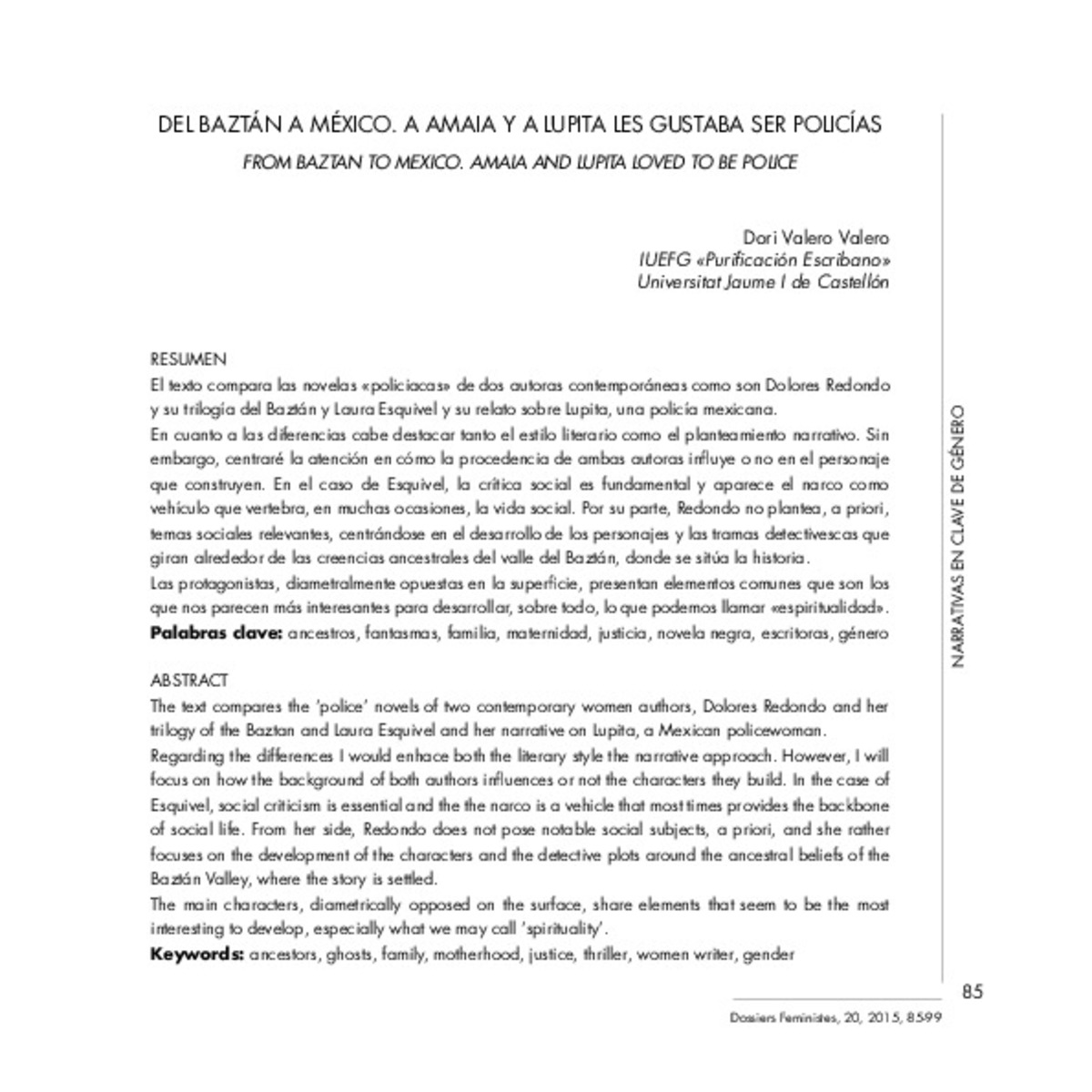Mostrar el registro sencillo del ítem
Del Baztán a México. A Amaia y a Lupita les gustaba ser policías
| dc.contributor.author | Valero Valero, Dori | |
| dc.date.accessioned | 2017-02-28T13:10:24Z | |
| dc.date.available | 2017-02-28T13:10:24Z | |
| dc.date.issued | 2015 | |
| dc.identifier.citation | VALERO VALERO, Adoración. Del Baztán a México. A Amaia ya Lupita les gustaba ser policías. Dossiers feministes, 2015, no 20, p. 85-99. | ca_CA |
| dc.identifier.issn | 1139-1219 | |
| dc.identifier.issn | 2340-4930 | |
| dc.identifier.uri | http://hdl.handle.net/10234/166340 | |
| dc.description.abstract | El texto compara las novelas «policiacas» de dos autoras contemporáneas como son Dolores Redondo y su trilogía del Baztán y Laura Esquivel y su relato sobre Lupita, una policía mexicana. En cuanto a las diferencias cabe destacar tanto el estilo literario como el planteamiento narrativo. Sin embargo, centraré la atención en cómo la procedencia de ambas autoras influye o no en el personaje que construyen. En el caso de Esquivel, la crítica social es fundamental y aparece el narco como vehículo que vertebra, en muchas ocasiones, la vida social. Por su parte, Redondo no plantea, a priori, temas sociales relevantes, centrándose en el desarrollo de los personajes y las tramas detectivescas que giran alrededor de las creencias ancestrales del valle del Baztán, donde se sitúa la historia. Las protagonistas, diametralmente opuestas en la superficie, presentan elementos comunes que son los que nos parecen más interesantes para desarrollar, sobre todo, lo que podemos llamar «espiritualidad». | ca_CA |
| dc.description.abstract | The text compares the ‘police’ novels of two contemporary women authors, Dolores Redondo and her trilogy of the Baztan and Laura Esquivel and her narrative on Lupita, a Mexican policewoman. Regarding the differences I would enhace both the literary style the narrative approach. However, I will focus on how the background of both authors influences or not the characters they build. In the case of Esquivel, social criticism is essential and the the narco is a vehicle that most times provides the backbone of social life. From her side, Redondo does not pose notable social subjects, a priori, and she rather focuses on the development of the characters and the detective plots around the ancestral beliefs of the Baztán Valley, where the story is settled. The main characters, diametrically opposed on the surface, share elements that seem to be the most interesting to develop, especially what we may call ‘spirituality’. | ca_CA |
| dc.format.extent | 15 p. | ca_CA |
| dc.format.mimetype | application/pdf | ca_CA |
| dc.language.iso | spa | ca_CA |
| dc.publisher | Universitat Jaume I. Institut Universitari d'Estudis Feministes i de Gènere | ca_CA |
| dc.relation.isPartOf | Dossiers feministes, 2015, no. 20 | ca_CA |
| dc.rights.uri | http://rightsstatements.org/vocab/CNE/1.0/ | * |
| dc.subject | ancestros | ca_CA |
| dc.subject | fantasmas | ca_CA |
| dc.subject | familia | ca_CA |
| dc.subject | maternidad | ca_CA |
| dc.subject | justicia | ca_CA |
| dc.subject | novela negra | ca_CA |
| dc.subject | escritoras | ca_CA |
| dc.subject | género | ca_CA |
| dc.subject | ancestors | ca_CA |
| dc.subject | ghosts | ca_CA |
| dc.subject | family | ca_CA |
| dc.subject | motherhood | ca_CA |
| dc.subject | justice | ca_CA |
| dc.subject | thriller | ca_CA |
| dc.subject | women writer | ca_CA |
| dc.subject | gender | ca_CA |
| dc.title | Del Baztán a México. A Amaia y a Lupita les gustaba ser policías | ca_CA |
| dc.title.alternative | From Baztan to Mexico. Amaia and Lupita loved to be police | ca_CA |
| dc.type | info:eu-repo/semantics/article | ca_CA |
| dc.rights.accessRights | info:eu-repo/semantics/openAccess | ca_CA |
| dc.relation.publisherVersion | http://www.e-revistes.uji.es/index.php/dossiers/article/view/1748/1800 | ca_CA |







